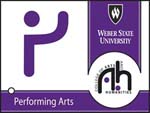 |
Junior High and Middle School MethodsProfessor: Thomas Priest, Ed.D
|
Junior High and Middle School Methods
Professor: Thomas Priest, Ed.D
| Classroom: BC 210, T,TH | Office: BC 351, BC 331 |
| 2 Credit Hours | Office Hours: T & TH at 10:30 or by appointment |
| Telephone: (801) 626-7181 | Email: tpriest@weber.edu |
Completed Piano Proficiency
Music Methods for Junior High and Middle School Students, Thomas Priest (Editor). University Custom Publishing (current edition).
Required Materials
Course Objectives
By the end of the course you should be able to:
Course Assignments
The assignments are designed to help you meet the course objectives (See
above). In order to succeed in the class, it is in your best interest to
plan ahead and work on the more difficult assignments*** throughout the
semester. You may turn in assignments early.
| Assignment | |
| (1) "Philosophical Foundations" (Objective 1). | |
| (2) "Does Music Make You Smarter?" (Objective 1). | |
| (3) "The Nature and Rewards of Music Teaching" and "The School Music Teacher" (Objective 1) | |
| (4) "Guidelines for Teaching Music" (Objectives 4). | |
| (5) "The Process of Learning Music" (Objective 4). | |
| (6) ***Exam I will take place in the testing center (Objectives 1 & 4) | |
(7) *** First Qualitative Research Journal and *** Music Repertoire Project (Objectives 1, 2, 4, & 7) Begin Working on Facets Model Assignment |
|
| (8) "National Standards for Arts Education" and "Thinking Processes in a Different Kind of Classroom" (Objective 1, 3, & 4) | |
| (9) "Getting to Know a Work of Art" and "Exploring Relationships Among the Arts" (Objective 6) | |
| "Teaching Middle School General Music" (Objectives 2, 3, 4, & 5) | |
| (10) ***Exam II will take place in the testing center (Objectives 1, 2, 3, 4, 5, & 6) | |
| (11) ***Facets Model (Objective 3) | |
| (12) ***Unit Plan and Teaching Episode (Objective
4) |
|
| (13) ***Second Qualitative Research Journal (Objective 7) |
| "Philosophical Foundations" " Does Music Make You Smarter?" " The Nature and Rewards of Music Teaching" and "The School Music Teacher" " Guidelines for Teaching Music" "The Process of Learning Music" "National Standards for Arts Education" and "Thinking Processes in a Different Kind of Classroom" " Getting to Know a Work of Art" and "Exploring Relationships Among the Arts" " Teaching Middle School General Music" |
|
| Exams (100) |
|
| Qualitative Research Journal (100) |
|
| Music Repertoire Project |
|
| Facets Model |
|
| Unit Plan (50) and Teaching Episode (50) |
|
| Total |
|
Since several assignments are designed to help you succeed in completing the other more difficult assignments, all assignments must be completed (regardless of total points) to receive a C or higher in the course. 10% will be subtracted for each day an assignment is late. You may figure out your final letter grade by dividing the sum of your points by 400.
A, A- = Outstanding completion of all course requirements or 90-100%
B+, B, B- = All course requirements completed with competence and accuracy
or 80-89%
C+, C, C- = All course requirements adequately completed or 70-79%
D+, D, D- = Some course requirements not completed or 60-69%
E = Several course requirements not completed or 59% or below